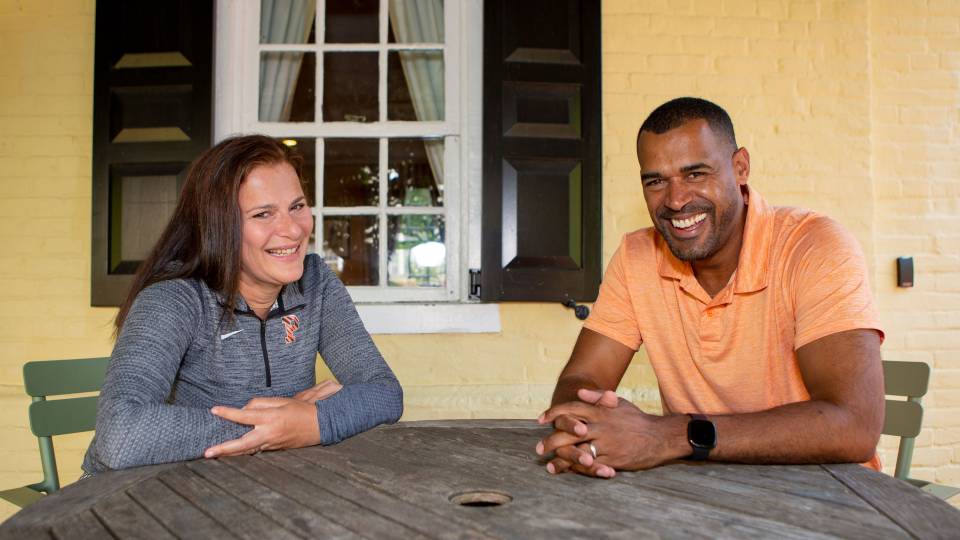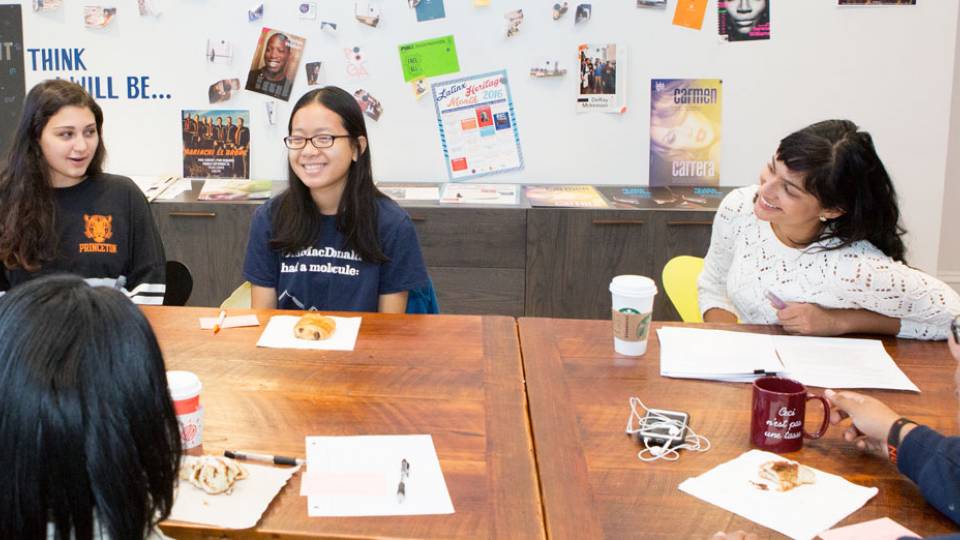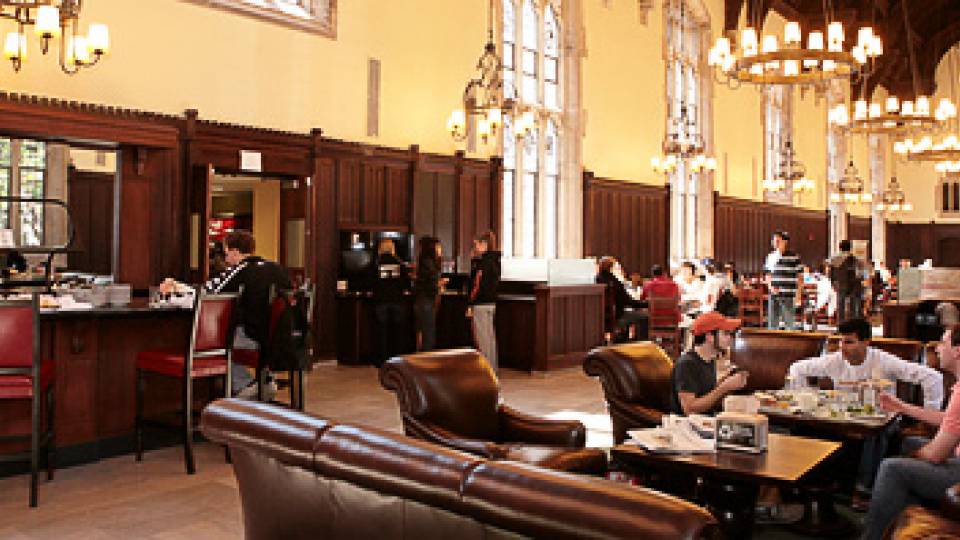Directors of Student Life are the glue that helps hold Princeton’s residential colleges together, says senior Cecilia Kim. Directors of Student Life(Link is external) (DSLs) are advisers, supporters, mentors and counselors whose job is to help students make their residential experience on campus meaningful and enjoyable.
“They help students make the transition to University, look out for the health and wellbeing of students, and support students as they navigate the different, and at times difficult, aspects of the college experience,” said Kim, a proud member of Mathey College.

Princeton’s Directors of Student Life (left to right): Joe Rolón, Amy Ham Johnson, Garrett Meggs, Claire Pinciaro, Darleny Cepin, Justin Smith and Momo Wolapaye.
Princeton’s residential colleges(Link is external) are a community of dormitories where students live and eat on campus. Each college has a faculty head of college, dean, assistant dean, director of student life and other support staff, including new live-in staff called residential life coordinators.
DSLs are the primary point person in every residential college for discussions of health, wellness and campus resources(Link is external). They help cultivate a sense of belonging at Princeton; serve as a liaison between students and academic deans and other Campus Life offices; help students understand the value of living in a diverse community; help uphold community expectations for residential living; oversee the Residential College Advisers (juniors and seniors who mentor small groups of first-year students); and help plan educational and social programs for all undergraduates. DSLs will also oversee the new Residential Life Coordinators (RLCs), who will live in each college and assist in building a welcoming and cohesive community by supporting the health, safety and wellbeing of students.
Below, Darleny Cepin, Amy Ham Johnson and Momo Wolapaye — the three longest serving DSLs — talk about how they support student wellbeing and share their favorite parts about working with undergraduates. In addition to Cepin, Johnson and Wolapaye, this year’s Directors of Student Life are Garrett Meggs, Claire Pinciaro, Joe Rolón and Justin Smith.
Darleny Cepin, Director of Student Life, Mathey College

Students participate in a mindfulness and meditation activity during Orientation.
What is a Director of Student Life’s role at Princeton?
Directors of Student Life are part of the Office of the Dean of Undergraduate Students(Link is external), and work directly with and in the residential colleges. DSLs are seminal partners in helping students make their college experience meaningful.
The heart of a DSL’s work involves facilitating opportunities for students to make connections between the learning that happens inside and outside of the classroom. In addition to working with students in the residential colleges, DSLs connect students to resources across the University through partnerships with faculty, graduate students, administrators and other offices, such as University Health Services. DSLs also play an important role in helping students understand and adhere to community standards in an effective and educational manner.
Overall, a DSL’s connection with students impacts the culture, tone and feel of student life on campus.
What is your favorite part about being a DSL?
I am incredibly grateful for getting the opportunity to “be” in the work that I have done during the past five years. Who I am and what I do are in great alignment. My favorite part of my work in Mathey College is being able to model vulnerability and authenticity to my students by meeting them where they’re at in a way that expresses empathy and understanding. Being a Latina, first-generation, high-achieving college student myself, I came to know firsthand the impact that student affairs professionals can make in helping students navigate the college experience. I strive to pay forward the kind of help that I received in ways that make students feel seen, heard and appreciated. I am so honored that I get to relate to students at a personal level in this work and that, in doing so, students have allowed me to partake in their happiest, saddest, and challenging moments. I’ve learned so much from every student whose journey I’ve shared. Walking alongside students, I get to see the campus experience full circle: there is no perfect path, and everything will be okay.
How do DSLs and other residential college staff support students’ health and wellbeing?
One of the primary responsibilities of a DSL is to approach students empathetically, understanding that the pressures of University life are very real. Students are often in need of a listening ear and guiding voice. The residential colleges’ Live Well, Be Well program aims to empower and inspire a healthy lifestyle and sense of wellbeing. We recognize that this is an active, ongoing process. We don’t expect students to figure it out all on their own. Throughout the semester, DSLs offer a variety of formal and informal activities that empower students to build practical skills in the areas of personal health and mindfulness.
We work very closely with campus partners; as such, we have cast a wide net, not limited to but including University Health Services, Counseling and Psychological Services, Department of Public Safety, the Gender and Sexuality Resource Center, Campus Recreation, Office of Disability Services, and Office of Religious Life. Princeton and the residential colleges have much to offer as students explore their personal path to wellness.
What is the First Year Residential Experience (FYRE) program?
FYRE is a coordinated set of programs and opportunities for first-year students that is framed to emphasize important community values related to civility and citizenship, health and wellbeing, and inclusion and belonging. Past events have included mindfulness and meditation sessions, and panel discussions with alumni about their Princeton experiences. The program aims to boost first-years’ sense of belonging at Princeton and introduce them to campus resources. By the end of their first year, we hope students can demonstrate knowledge of campus resources, develop the skills to build meaningful relationships with peers who may hold identities and backgrounds different from their own, and make informed decisions that enhance their personal health and growth.
Amy Ham Johnson, Director of Student Life, Rockefeller College
What is your favorite part about being a DSL?

Rockefeller College Director of Student Life Amy Ham Johnson (far left, in front) celebrates with “Rocky” students during the annual Clash of the Colleges event for incoming first-year students.
My favorite part of the position is building relationships with students! I want students to understand that I can be a resource for all kinds of questions — big or small. Sometimes my interactions with students are briefer, and maybe they only needed my support for a short amount of time. I take value in all exchanges, also, especially if I feel I advised someone through a concern they were addressing. I truly enjoy helping students find their paths through Princeton and celebrating them when they graduate.
What is important for first-year students and their families to know about DSLs?
I want students and their families to know that DSLs are always available. On nights and weekends, DSLs participate in a 24/7 on-call rotation. Students can talk with any of the DSLs, not just the one from their assigned residential college.
It can be difficult to ask for help, but I want students to recognize that asking for help is not a sign of weakness, it is actually a sign of strength. Sometimes students want to manage situations on their own, and I want to certainly encourage independence and growth, but there are times that a student may not realize they need more support. I would rather students reach out and ask questions or meet with me if they feel something is getting more challenging for them – whether it’s about their residential experience, a personal challenge they are facing, health or wellness related concerns, or something occurring back home that worries them. I want students to feel comfortable talking to me, so anything that I can do to assist with that is important, also.
Has there been a particular interaction with a student that has impacted your time at Princeton?
Recently, I had a student reach out to me a few years after graduation and thank me for my support, care and mentorship during their time as an undergraduate. It made me pause and consider the impact I had played in that student’s life. You may engage with students when they are feeling stressed, and you want to provide a space for them to process what they are feeling or strategize with them what the best next steps are for them. When you are helping students, you are focusing on how to address the concerns in the moment, and I really appreciated hearing from that student how I impacted his life positively, even years later.
Momo Wolapaye, Director of Student Life, Whitman College
What is your favorite part about being a DSL?
My favorite part about being a DSL is getting to meet the students and their families and developing meaningful relationships with them. It is amazing to watch students’ growth and development over their four years at Princeton. I am originally from Monrovia, Liberia, and it is fascinating to meet people from all over the world who bring very diverse perspectives to the University.
What is the difference between Directors of Student Life and Residential College Advisers?
The Directors of Student Life are full-time University staff members, often with advanced degrees in education or counseling. The Residential College Advisers (RCAs) are Princeton juniors and seniors who live in the dorms. The DSLs recruit, hire, train and supervise the residential college advisers. Each RCA has a group of first-year advisees (or “zees” as we say at Princeton). As a DSL, I have regular meetings with the RCAs in Whitman College. We talk about what’s happening in their groups and I share guidance with them. I also help RCAs plan events for their zee groups, like weekly study breaks. Those study breaks could be formal programs, like a book discussion, or just a rest-and-relaxation session with food.
How do Directors of Student Life and Residential College Advisers work together to support students?
The RCAs role in supporting their zees’ wellness is crucial to our success in addressing students’ wellness needs. Because the RCAs live in the dorms with first-years, they get to know their zees very closely and can recognize if a particular student may need extra help. Often, it’s an RCA who will ask me for guidance about how to best support a particular student. We may work together to determine it’s best to refer a student directly to their DSLs for more support, or to refer a student to other campus resources. A student recently wrote me to share an instance where the RCA noticed a difference in the student’s mood during a brief interaction. The RCA later reached out to the student, who shared that they had been experiencing some challenges that they hadn’t felt comfortable talking about at first but later felt relieved after doing so. The RCA went out of their way to make that student know they cared and were there to listen to them. It’s those little interactions and connections that can make a big difference.





